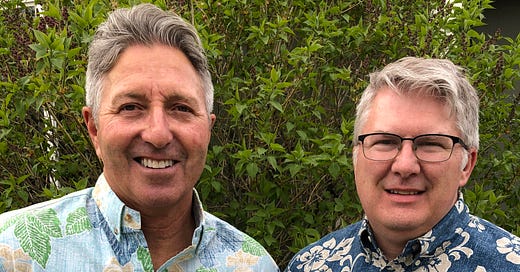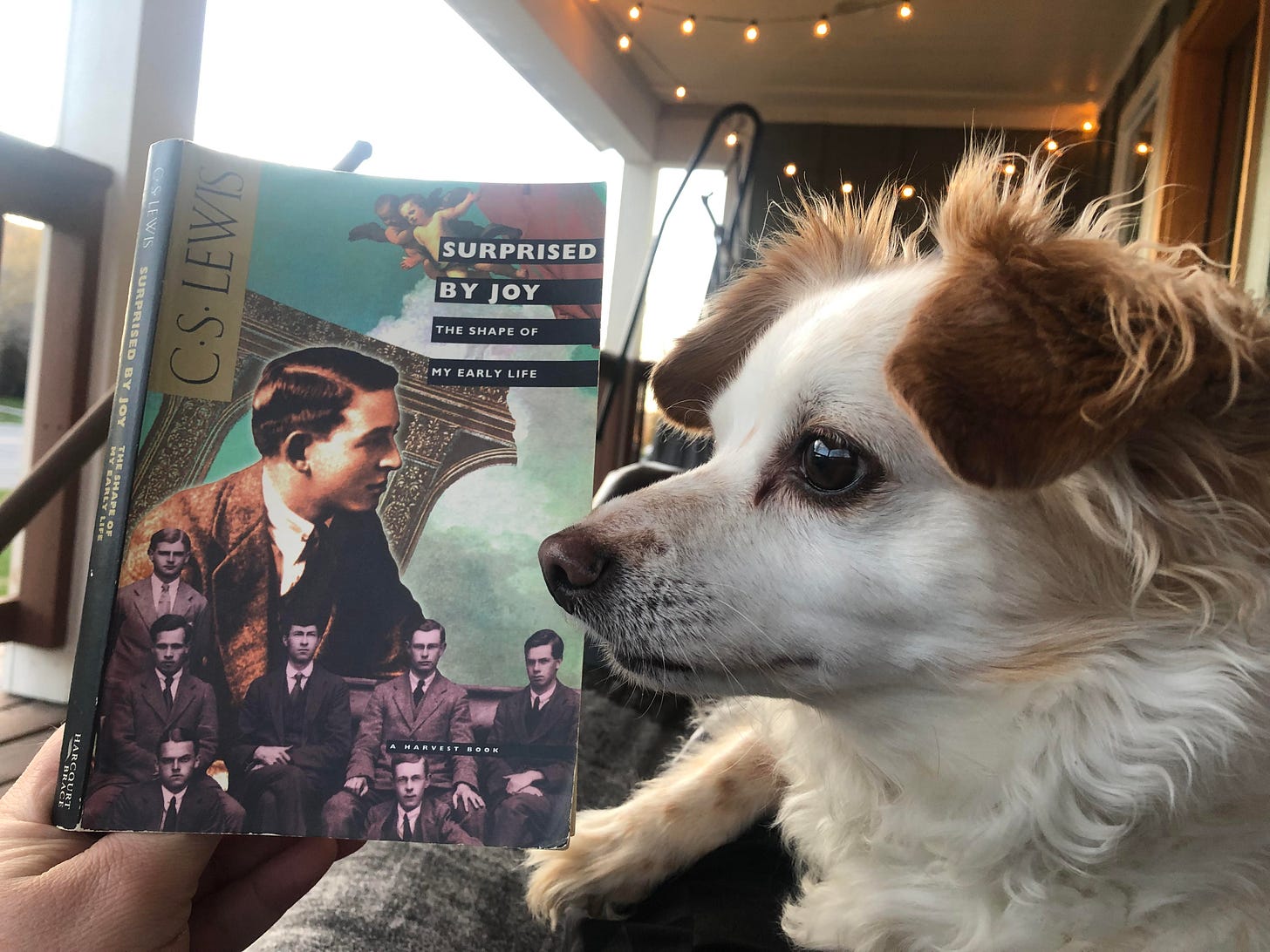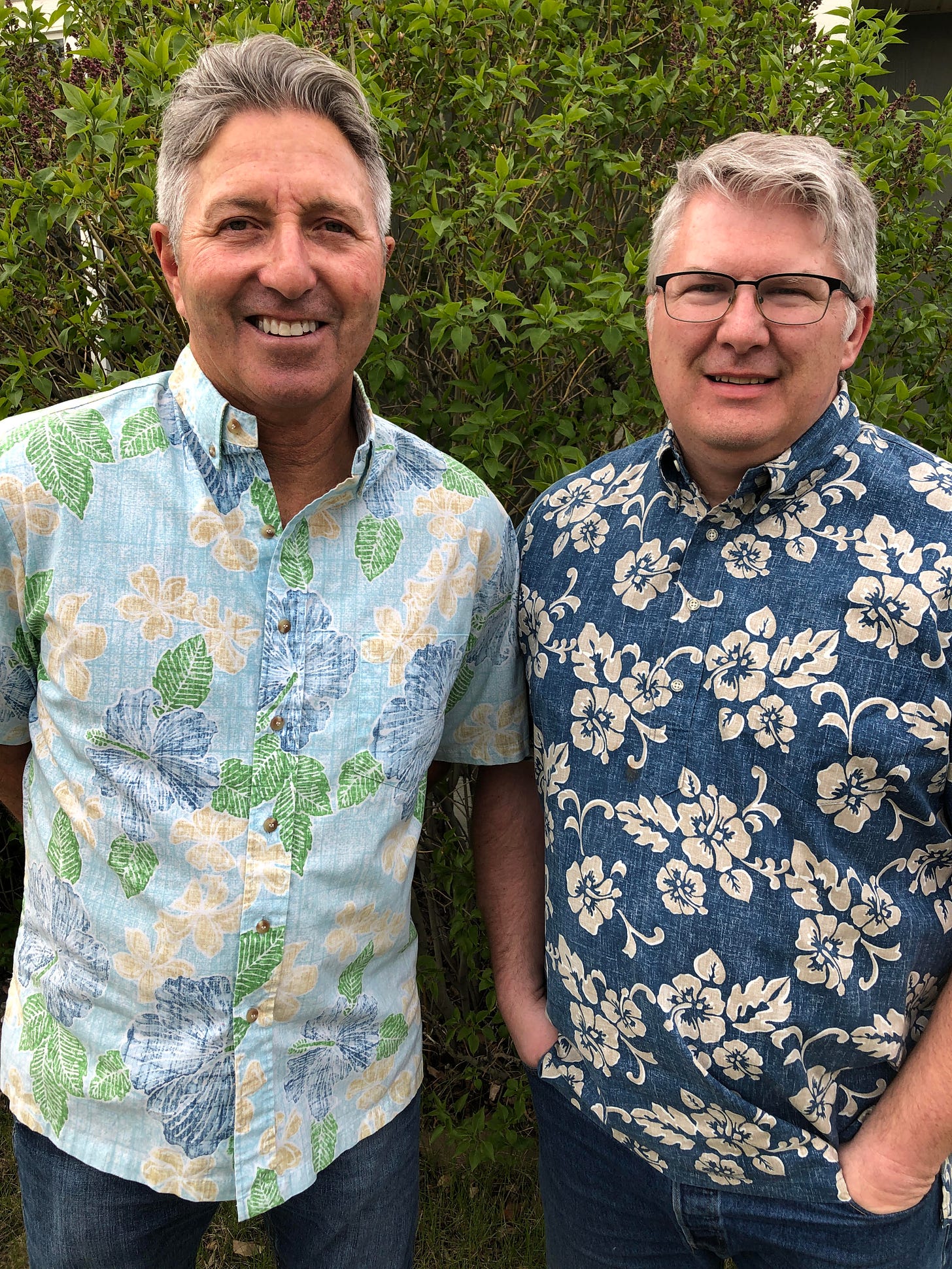Dear Reader,
If there was a theme to the news this week, it had to be that America continues to come apart at the seams: another school shooting (with rampant conspiracy theories); Southern Baptists caught keeping their wolves in sheeps’ clothing; and Winnie the Pooh and Piglet going “feral” in a new movie now that A.A. Milne’s copyright is five months into the public domain.
Amber and Johnny are taking up way too much air time, and now the San Francisco Unified School District is outlawing the word “chief” in its job titles to avoid offense. (Newsflash: As Lulu Cheng Meservey, VP of Communications for Substack, tweeted, “‘Chief’ is an English word that comes from a French word that comes from a Latin word,” but oh, well.)
Strange things are afoot at the Circle K, folks; people are losing their minds and “common sense” is not so common anymore. In an attempt to explain things, we can dress it up however we want—degrading mental health, crumbling institutional foundations, rotting heart and soul of culture (and each applies to some degree)—but don’t miss that one word nobody likes (and even fewer accept) as undergirding it all: “sin”—choosing against and apart from God.
“Any solutions?” you ask. Some, but few that will make sense apart from God’s promise to Old Testament Israel (and us by way of His covenant mediator, Jesus) in Deuteronomy 30:15-20:
“See, I have set before you today life and good, death and evil. If you obey the commandments of the Lord your God that I command you today, by loving the Lord your God, by walking in his ways, and by keeping his commandments and his statutes and his rules, then you shall live and multiply, and the Lord your God will bless you in the land that you are entering to take possession of it. But if your heart turns away, and you will not hear, but are drawn away to worship other gods and serve them, I declare to you today, that you shall surely perish. You shall not live long in the land that you are going over the Jordan to enter and possess. I call heaven and earth to witness against you today, that I have set before you life and death, blessing and curse. Therefore choose life, that you and your offspring may live, loving the Lord your God, obeying his voice and holding fast to him, for he is your life and length of days, that you may dwell in the land that the Lord swore to your fathers, to Abraham, to Isaac, and to Jacob, to give them.”
As my father sometimes says (in jest) to my mother, “Everybody’s crazy but us…and sometimes I wonder about you.” How long until the “crazy” takes us all past the point of no return? I want to think I’m prepared for the worst, but perhaps like you, I’d rather not have to find out.
Thanks for reading Second Drafts,
Craig
PS: This week’s newsletter is a long one and Gmail clips emails at 102K, so you may need to continue reading it in your browser (just click “View Entire Message” at the end of the email).
Programming Note: Surprised by Joy by C.S. Lewis Review This Saturday
For all paid subscribers, May’s book review tomorrow will be on Surprised by Joy, C.S. Lewis’ part memoir, part history, part apologetics book. From the back cover:
“C. S. Lewis—the great British writer, scholar, lay theologian, broadcaster, Christian apologist, and bestselling author of Mere Christianity, The Screwtape Letters, The Great Divorce, The Chronicles of Narnia, and many other beloved classics—takes readers on a spiritual journey through his early life and eventual embrace of the Christian faith. Lewis begins with his childhood in Belfast, surveys his boarding school years and his youthful atheism in England, reflects on his experience in World War I, and ends at Oxford, where he became ‘the most dejected and reluctant convert in all England.’ As he recounts his lifelong search for joy, Lewis demonstrates its role in guiding him to find God.”
Not a paid subscriber? $5/month gets you access to all book reviews and podcasts.
Hot Takes
“An Archbishop Bars Pelosi from Communion Over Her Support for Abortion Rights” - It’s refreshing to see a church leader actually care for members of his flock, even (and especially) when one of them is the United States Speaker of the House:
“The Catholic archbishop of San Francisco says that U.S. House Speaker Nancy Pelosi is no longer allowed to receive Communion because of her vocal support for abortion rights.
Salvatore Cordileone, the conservative archbishop, said he'd previously made his concerns known to Pelosi, D-Calif., in an April 7 letter after she promised to codify into federal law the right to abortion established by the Supreme Court in Roe v. Wade. Cordileone said he never received a response from Pelosi.
Cordileone notified members of the archdiocese in a letter on Friday that Pelosi must publicly repudiate her support for abortion rights in order to take Holy Communion—a ritual meal of bread and wine that celebrates the life, death and resurrection of Jesus.
‘After numerous attempts to speak with her to help her understand the grave evil she is perpetrating, the scandal she is causing, and the danger to her own soul she is risking, I have determined that the point has come in which I must make a public declaration that she is not to be admitted to Holy Communion,’ Cordileone wrote.”
Some will disagree, but I appreciate professor David Koyzis’ perspective:
“Is the Archbishop right to do this? Some critics would charge that he is ‘weaponizing the Eucharist,’ that is, misusing one of the church’s sacraments to advance a partisan political agenda. Some would further hold that, in taking this action, he is causing the church to interfere in politics, where people of a variety of faiths must co-operate to serve the public interest. I do not find these objections persuasive.
Although I am not a member of Cordileone’s communion [Koyzis is Orthodox], I do not believe that he exceeds his legitimate authority over one of his flock. Of course, no church should pretend to instruct public officials who are members which policies they should be pursuing…But the church, as a particular differentiated institution with its own divinely-appointed task, does indeed bear responsibility for disciplining its members, whether or not they hold public office. In fact, the Belgic Confession states that one of the marks of the true church is that ‘it practices church discipline for correcting faults.’
Not all churches maintain such discipline, of course. The current spirit dominating many churches would have us simply affirm people and include them without making demands that might entail sacrifice or even mild discomfort. Yet, as any parent of small children knows, genuine love requires discipline and correction. As the author of the letter to the Hebrews expresses it, ‘For the moment all discipline seems painful rather than pleasant; later it yields the peaceful fruit of righteousness to those who have been trained by it’ (Hebrews 12:11). A church that spurns discipline out of misguided sentiment risks losing its status as a church. Affirming sinners in their sin is not at all loving and places them in danger of divine judgment.
'Cordileone’s pastoral concern is for a member of his own flock who just happens to be Speaker of the House of Representatives. Pelosi’s office does not and should not exempt her from his care for her spiritual well being. If ending the life of a child in the womb is indeed a sin and if encouraging one to commit this sin endangers one’s status before God, then Pelosi ought to be thankful that her bishop has seen fit to call her back to the path of truth, justice, and life. May God give her the grace to amend her life and her public witness through Cordileone’s ministry.”
As a side note and just to keep in mind whenever reading national news organizations on religious stories, very few outlets have a qualified reporter dedicated to religious news anymore, as evidenced by this pretty significant mischaracterization of the Catholic view of the Eucharist. (Will somebody at NPR hire me already, please?)

“The Sinister Symmetry of CRT And GRT” - More a commentary than a facts-only piece (is anyone even writing those anymore?), I was intrigued by Andrew Sullivan’s take on CRT (Critical Race Theory) and GRT (Great Replacement Theory). He writes:
“The MSM [mainstream media] rushed last weekend to explain the previously obscure conspiracy theory that motivated a mass-murderer on a shooting spree in a black neighborhood in Buffalo, New York. We didn’t get to read the warped ‘manifesto’ of the mass shooter, but we were told about its account of ‘Great Replacement Theory.’ It posits that a shadowy, global elite (in this case — surprise! — Jewish) is deliberately fostering mass non-white immigration to dilute the voting power of white Americans. The goal is a minority-majority country in which the Republican Party is doomed by inexorable racial demographics, and a whole new multiracial society can be built on the smoldering ruins of ‘white supremacy.’”
The point, as Sullivan goes on to observe, is that the Left is accusing the Right of feeding racial tensions with GRT, whereas the Right continues to accuse the Left of feeding the same racial tensions with CRT. The problem? Neither is helping.
“And this is the trap we are in. CRT and GRT are in a deadly and poisonous dance in our culture. They foster ever-increasing levels of racial identity in each other; they demonize whole populations because of skin color; they both believe liberal democracy is rigged against them; and the logic of their mutual, absolutist racial politics is civil conflict, not democratic deliberation.
If we are to get past the kind of ugly violence and race essentialism in Great Replacement Theory, then we also need an antidote to the toxins of Critical Race Theory. The two illiberalisms are profoundly connected. They need each other. And, in their racialized heart, they are morally exactly the same.”

Telling Stories of Immortals
Over the past year, I’ve been involved in two memoir projects: the first, Everyone Has a Story…and This Is Mine, is my mother Charlotte’s book about her life, completed via Storyworth; the second, Mako’s World, is the life tale of Montana Instruments CEO, Mark Carroll (a.k.a. “Mako”), which he and I are self-publishing via Amazon. I suppose one could make the argument that my earlier books, TwentySomeone and Learning Education, are “memoir-ish,” but I think of them as practical/pedagogical projects with personal stories sprinkled throughout to illustrate didactic points.
But I digress.
A year or so ago, I had a conversation with a friend who, upon hearing that I was about to begin helping Mark (whom he didn’t know, nor ever met), asked a question:
“So, is his a life worth writing a memoir about?”
I understood where he was coming from; writing books takes time, a commodity of which we only have a limited amount. In addition, memoirs that get written these days are usually by/about well-known people, since publishers only want subjects with pre-built people platforms (regardless of reason) to translate into book sales.
In my mind, I quickly ran through a list of categories as to what made a life “worthy” of a memoir, a genre that has seen tremendous growth in the past 25-30 years: fame (or infamy); success (or failure); love gained (or lost); trust won (or lost); unbelievable (or incredibly believable) story. By these criteria, was this a legitimate undertaking?
Then I remembered this passage from C.S. Lewis in The Weight of Glory:
“It is a serious thing to live in a society of possible gods and goddesses, to remember that the dullest and most uninteresting person you talk to may one day be a creature which, if you saw it now, you would be strongly tempted to worship, or else a horror and a corruption such as you now meet, if at all, only in a nightmare.
All day long we are, in some degree, helping each other to one or other of these destinations. It is in the light of these overwhelming possibilities, it is with the awe and circumspection proper to them, that we should conduct all our dealings with one another, all friendships, all loves, all play, all politics.
There are no ordinary people. You have never talked to a mere mortal. Nations, cultures, arts, civilization—these are mortal, and their life is to ours as the life of a gnat. But it is immortals whom we joke with, work with, marry, snub, and exploit—immortal horrors or everlasting splendors.
Next to the Blessed Sacrament itself, your neighbor is the holiest object presented to your senses.”
Was Mark’s life worth capturing in a memoir? For plenty of inspiring storytelling reasons alone, I would say, “yes,” but as a Christian (and with Lewis’ thoughts informing my own), I have to say, “definitely, yes.” Because we are all created in the image of God, it follows that each of our lives is “worth” capturing in a memoir.
This, of course, doesn’t mean that everyone will read Mark’s memoir. In fact, just last week, in a set of comments left on a Facebook post in which I had announced the pre-release of Mako’s World, another friend wrote:
“I'm having trouble deciding whether the fact that you helped write this book can overcome the fact that I really have no interest in the guy’s life…The question is whether you have the skill to make me enjoy reading something that I don't care about at all. The answer is, probably. The question is, is it probably worth $15? The answer is maybe.”
I was perturbed. True, a majority of readers—especially those of us who grew up in the Midwest or the mountains and have only ever surfed with a television remote—may not be into surfing, but the book is not only about beach life, as the summary and website endorsements clearly explain. Quality of story and writing aside (though both of which I’ll vouch for), isn’t it worth $14.99 ($9.99 if you want to spend less for a Kindle download) to affirm a friend’s writing efforts across a year’s worth of evenings and weekends? Books don’t write themselves, you know. Sheesh.
All that said (and coaxing my wounded pride back into its cage), here are two truths and a lie I’ve discovered about memoir writing that I hope will encourage you to consider writing yours in some form or fashion before your days are through.
Truth #1: Memoirs Don’t Have to Cover All of Life; in Fact, Some of the Best Ones Don’t
You may have heard of former Presidents working on their “memoirs” (plural), which is to say they’re trying to capture as many memories from the whole of their lives and presidencies for posterity. This can seem daunting (and it is) because of the the detail, emotion, fact, truth (assuming there’s some), and outcome of that President’s life and leadership. Most Presidential memoirs are written as all-encompassing as possible because people are interested in both the Office as well as the person who was in it.
For Mark, being 60 and having the goal of wanting to capture as much of his life and his lessons learned for his college-aged kids, it made sense that we would write a full-life memoir; in fact, because of the significant role of Mark’s father in his life before he died when Mark was just 10, it became clear that we needed to devote an entire first chapter to Kenneth to set the stage before Mark was even on the scene.
Since I wasn’t familiar with Mark’s life (we had only known and worked together for six months previous to the book), I asked him at one of our first meetings to complete a preliminary timeline of “highlights,” “lowlights,” and “plateaus.” This gave me an initial idea of the chronology of his life and insight into his perception of people, events, and ideas that impacted him most. When we met each week (usually on a Saturday morning; never on company time), we pulled out the timeline and I asked him to choose two to three stories to tell me as if we were sitting around a campfire.
After four months of this weekly ritual (as well as a long weekend trip together to his native California last October), we began to identify themes that emerged and seemed to build on each other—the impact of the loss of his father; his struggle with his widowed mother; the insecurities formed in his childhood; the centering nature of surfing and mechanical engineering that helped him navigate adulthood; his wife’s love and understanding, etc. From there, I started arranging content in terms of chapters and titles to organize the narrative and write it out chronologically.
While Mako’s World is an example of writing a full treatment of one’s “memoirs” (plural), not every “memoir” (singular) has to be like that. For some, writing a memoir about just one’s childhood, or an era of a particular vocational period, or even an expanded retelling of a special vacation can be a good way to start small and get a tale or two under the belt before setting out to write one’s full memoirs.
For reference (and in no particular order), here are a handful of good non-full-life memoirs I’ve enjoyed:
C.S. Lewis’ Surprised by Joy: The Shape of My Early Life
Joan Didion’s The Year of Magical Thinking
J.D. Vance’s Hillbilly Elegy
Tara Westover’s Educated
Sarah Smarsh’s Heartland: A Memoir of Working Hard and Being Broke in the Richest County on Earth
Frank McCourt’s Angela’s Ashes
Jon Krakauer’s Into Thin Air: A Personal Account of the Mount Everest Disaster
Jeannette Walls’ The Glass Castle
Lauren Winner’s Girl Meets God
Anne Frank’s The Diary of a Young Girl
Feel free to share any you have enjoyed.
Truth #2: Facts and Good Stories Matter, But Themes and Life Lessons Matter More
Continuing the story-gathering phase while beginning the organization phase, I started cutting and pasting my draft treatments of Mark’s stories into chapters and sections. Some flowed together and made sense right next to/leading into each other; others didn’t, needing more exegetical or transitional writing to really tie the book together (a la The Dude’s rug in The Big Lebowski).
During this time, I sent 60 pages of the manuscript that were the most fully-formed to a trusted friend who also happens to be a professional editor. After reading through the sample, she loved me enough to tell me that the writing was good, but she wasn’t getting the story that the writing was trying to tell (and for whom). Her words:
“I'm not getting the hook. Is he writing this book just to tell his stories? It feels like a bunch of somewhat interesting stories from someone I don't know or have reason to care about. Is there something I'm supposed to learn from him? Right now, it feels like something he’d give to his kids and maybe a surfing buddy or two. How will a wider audience be convinced that this is a book they need to read?
I like it more as an editor than I do as a publisher or a marketer. It’s well-written. The stories are well-told. It flows. Organization is good…But I don't know who would publish this, or who the audience would be.”
She was having trouble connecting with the stories because I was having trouble connecting the meaning of the stories. Her feedback was gold and helped me identify the next phase of what the process needed to be—drawing out the themes and life lessons that, despite settings and experiences that I or other readers had perhaps not experienced (I’ve not been to Fiji, have you?), would carry meaning if better connected.
So, I took another shot at what we had so far, attempting to draw out more of the emotion and internal thoughts from Mark for each story. This was hard for both of us—for Mark, because doing so was painful at times; for me, because I knew I was largely the cause of the pain. Trust was important—in each other as well as in our back-and-forth process—to discern and describe the meaning making it to the surface.
Indeed, we worked hard to fact-check and get the details right, but we worked harder at drawing out the import of the stories that told the story of Mark’s life. Seeing as how this was the first memoir either of us had ever worked on, I’m sure we could have done it better, but I think we’d both agree that we improved as we went along.
Perhaps the biggest affirmation of our efforts came in an email from Mark’s childhood best friend. I had met Eric on the California trip and he was somewhat skeptical of what Mark and I were trying to do (think about it: how seriously would you take one of your childhood friends who flies a “writer” home for a weekend to interview your friends for his memoir?). After the visit, I sent the same 60 pages to Eric and he returned with some helpful fact-checking, but that was it.
In March, Mark sent him a working draft of the full manuscript rewritten with my editor friend’s suggestions in mind. Eric responded to Mark with this email:
“I did not get your book the first time I read it. Now I do. This book is all about you. It’s about your journey. It’s about how the death of your father and the impact of having a single mother affected your very young mind. No child is ready to step in and be the father-figure for the family. But you tried to do that out of the love you felt for your family and, in your own words, you failed over and over again. But the beauty of this book is that you recognize it. You understand how it has taken a toll on you and despite it, you have lived a life to be very proud of.
You recognize how hard it has made relationships with women, but how thankful you are for a wife that has brought out the best in you. Someone who has done the most important job there is, raise two successful, beautiful children. Children who have been very fortunate and benefited from having a very dedicated father. You wrote this book because you don’t want your baggage to be their baggage and you want them to know why you are who you are. It takes a big man to recognize these faults, and even a bigger man to try and correct them.
It’s all part of Mako’s journey in becoming a better man. I have a better understanding of my life long friend!”
Not one word about surfing; the meaning transcended the activity. He totally got it, and that felt really, really good.
One Lie: Self-Published Memoirs Are Expected to Be Schlocky
Memoirs themselves are not that expensive to produce, at least not in terms of money; time is the real commodity, so if “time is money” for you and you’d rather pay someone else to write it, then yes, it might be pricey. Regardless, whether you or someone else does the writing, you’re going to have put the time in (your writer can’t write it without you and just make stuff up—that’s called “fiction”).
Storyworth’s subscription is a total of $99 for a year’s worth of software access and a finished hardback copy of the book. For my mother, who is a former English teacher, this worked well, as she did all her own writing and just needed prompts, which we could suggest and they emailed to her in the form of a weekly question on Sundays. Mom would spend the week thinking about the question, then sit down on Saturday to write to the prompt, which the Storyworth system captured and cataloged. By the end of the year, she had 52 chapters written, which I line-edited and added pictures to; from there, she hit “print” and a hardbound book showed up on her doorstep 10 days later. (Note: where Storyworth makes their money is on reprints, which cost $35/book).
Mark, on the other hand, doesn’t consider himself a writer (though when I would give him drafts, he always made good edits and suggestions), so he paid me to come alongside. The key to our process was that he was as committed to the project as I was (it would have been too exhausting to nag each other otherwise), and we kept each other accountable to keep going, which is what any kind of extended writing requires.
We would meet at least once a week (usually on a Saturday morning) for two hours in person (if he was in town) or via Zoom (if he was at home in California). Sometime during the next week, I would make time (usually anywhere from 8-10 hours total) in the evenings or early mornings to translate my handwritten notes into a working manuscript draft, which he would then mark up, send back, and I would re-edit. We went back and forth like this for eight months.
Because we were self-publishing, there was extra work involved after the writing was finished (which, of course, never really is, but it’s fun to pretend). With the kind of software and services (most web-based) available these days, one doesn’t have an excuse not to make the final product look good; again, it just takes time. I used Atticus ($147) to lay out the book, and then sent a couple of cell phone pics from the California trip with a title page mock-up to the folks at 100Covers.com ($200) for the front and back. Total dollar layout for production: approximately $350. (Note: To help with marketing, I had a friend put together a simple website to promote the book, but I could have just sent folks the Amazon link and been done with it.)
Speaking of Amazon, everything is free to set up (they take 40% and charge $3/book to print and $.72/book to download—prices vary, depending on page or megabyte count). But the best part is it’s print on demand, so there are no minimum print runs we pay for up front, author copies are available at printing cost plus shipping, and everyone can order copies and Amazon handles fulfillment according to the purchaser’s shipping status (Prime or otherwise).
All that to say, if you’re going to invest time and money in writing your memoir, budget to dress it up and make it professional. Too many self-published memoirs—even ones with interesting content and decent writing—suffer earning a perceived less-than-good quality due to bad layout and cover design. People do judge a book by its cover (and print job), so take advantage of what’s available and get a good verdict.
A Summer Memoir Project?
If Lewis is correct (and I believe he is), we all have a unique story to tell as part of God’s larger Kingdom story. This summer, why not start a memoir project of some kind? It doesn’t have to be an 800-page magnum opus (or it could be); maybe it’s a memoir of an extraordinary trip you took that you’d like to chronicle…or a collection of memories from your childhood…or a particularly memorable year of your life.
Whatever you decide on, commit to writing regularly (you can measure in terms of time, words, or pages per week) across June, July, and August and see what happens—just be consistent. You might surprise yourself (and others) with what you come up with as you cross that bridge all of us who love words long to regularly traverse—from being a writer who is writing, to being a writer who has written.
Want more food for thought about memoir? If you’re interested in writing one, here are some books (again, in no particular order) that I’ve found helpful:
Anne Lamott’s Bird by Bird: Some Instructions on Writing and Life
Stephen King’s On Writing: A Memoir of the Craft
William Zinsser’s Writing About Your Life: A Journey into the Past
Jerry Payne’s Writing Memoir: The Practical Guide to Writing and Publishing the Story of Your Life
Fresh & Random Linkage
“Nancy Brophy, Romance Novelist Who Wrote How to Murder Your Husband, Found Guilty of Murder 4 Years after Chef Spouse Found Dead in Kitchen” - Note to self: ask Megan Dunham if she’s done any “romance writing” of late.
“Montana Students Ride Horses to School as Prank on Principal” - Of all the weird laws still on the books in Montana, this may be my favorite.
Until next time.





